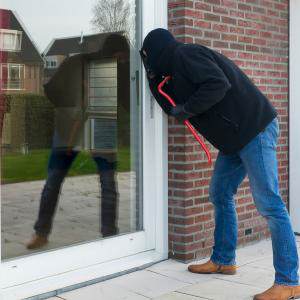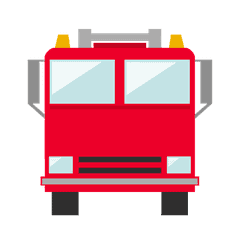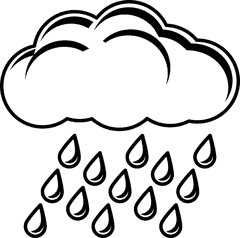7 Common Homeowner Insurance Questions
We prepared this Renters & Homeowners Insurance FAQ page as many of the questions are the same. From home burglary to dog bites, to identity theft, the answers are important. If you have questions about having adequate coverage – please contact us! We are here to answer.
What If My Home Is Burglarized?

Here are a few tips to help if you should encounter such a situation:
- If you suspect a burglar is still in the house, don’t go in! Go to a neighbor’s house to call the police.
- Wait until the police arrive before you enter and begin to take an inventory of what is missing. Don’t touch anything. The police may dust for fingerprints.
- Provide police with whatever information they require. Ask the investigating officer where you can obtain a copy of the police report. Make sure you write down the names and badge numbers of the police officers.
If you suspect a burglar is still in the house, don’t go in! Go to a neighbor’s house to call the police. Wait until the police arrive before you enter and begin to take an inventory of what is missing. Don’t touch anything. The police may dust for fingerprints. Provide police with whatever information they require. Ask the investigating officer where you can obtain a copy of the police report. Make sure you write down the names and badge numbers of the police officers.
If You Saw The Burglar, You Will Be Asked To Provide A Description Which Will Include:
- Height
- Build
- Clothing
- Hair/eye color
- Hair/beard style
- Distinctive markings
Once the police have finished the investigation, make your own inspection. Use a Home Inventory Checklist to check for missing items, otherwise, you may not discover the full extent of the theft until days or even months after the burglary. At the moment of crisis call the Claim Department for assistance when you need it most.
Safety Features That Get Insurance Discounts
Fay Insurance Agency provides premium discounts for taking precautionary measures. Protective devices such as alarm systems, deadbolt locks, local burglar alarms and central station burglar alarms all qualify for discounts but these discounts do vary by state. Contact me today to go over which discounts you may qualify for.
What If My Home Is Completely Destroyed In A Fire?
The first step in being prepared for a fire is to have a family evacuation plan. Plan a safe rendezvous point for you and your family in the event that you are separated during a fire.
Check Out Our Tips For Evacuating Your Home.

- Do not return to your home until officials declare it is safe to do so.
- Notify your agent. Make sure your representative knows where to contact you.
- Make a detailed list of all damaged or destroyed personal property. Use pictures to help assess the damages.
- Keep all receipts. Don’t rush into signing repair contracts.
- As soon as you and your family are safe, call the Claim Department for assistance when you need it most.
Tips For Surviving A Fire In Your Home:
- Make sure all family members know how to dial 911 in case of an emergency.
- Have at least two exits from every room in your home. Invest in fire escape ladders for upstairs bedrooms.
- Go through a practice drill every six months. With the whole family, practice what to do in a fire emergency.
- Assign a tree or other landmark where family members can meet after they escape the burning house.
- Teach children never to go back in the house. Train them not to hide from fire under beds, in closets or other places where rescuers cannot easily find them.
What if someone has an accident on my property or my pet bites someone?
The Insurance Institute estimates that up to one-third of homeowner liability claims are for dog attacks. What to do:
- Make sure the injured person gets prompt medical attention.
- Exchange names, addresses, and phone numbers.
- Tell the person who was bitten to save medical receipts. Assure them that your insurance agent will contact them.
- Call your insurance agent. Provide the information about the incident, the name and phone number of the victim, and have your policy number on hand.
- Report the dog bite to your local animal control center.
- At the moment of crisis call the Claim Department for assistance when you need it most.
If You Own A Dog:
- Spay or neuter your dog to reduce aggressive tendencies.
- Never leave infants or young children alone with the dog.
- Do not play aggressive games, like wrestling, with your dog.
- Teach children basic safety guidelines around the dog and review them frequently.
If You Are Threatened By A Dog:
- Remain motionless. Do not run or scream.
- If knocked down by the dog, lie still, cover your face and neck and remain in a ball.
- If bitten by the dog, immediately report the bite.
- Report stray dogs or dogs showing unusual behavior to your local animal control center.
- What if my home is damaged in a storm?
What to do before the storm:
- Make sure you have a record of your personal property.
- Keep important papers safe. Keep photocopies of your important personal and financial papers in a safe place away from your home.
- Preserve your photos. Store negatives in a safe place away from the house or make copies and do the same.
- Look around and assess the risks to your home. For instance, trimming tall trees near your house will prevent them from falling during a storm and causing damage.
- If tornados are a threat, consider building a safe room within your house.
What to do after the storm:
- Check people around you for injuries. Begin first aid or seek help if necessary.
- When you go outside, watch out for downed power lines.
- Beware of fire hazards such as broken gas lines.
- Make temporary repairs to prevent loss from rain, wind, or looting. Keep all receipts for work done on your property.
- Avoid using electrical appliances that have been exposed to water until they’ve been checked by a technician.
- Notify your agent as soon as possible. Make sure your agent knows where to contact you.
Take pictures and use a Home Inventory List to help your assess the damage. At the moment of crisis call the Claim Department for assistance when you need it most.
What do I do if a flood has destroyed my home?

Every year, people’s lives across the United States are disrupted by floods. It can be a very difficult period of time but flood insurance puts you in control. You can buy Flood Insurance no matter where you live; in High, Low or Moderate risk areas. Buying a Flood Insurance policy is one of the most important things you can do to protect yourself and reduce the cost of flooding disaster for your family or business. Contact your agent today for more information on Flood Insurance. You can take specific steps today to prepare for a flood tomorrow:
- Itemize all personal property including furnishing, clothing, and valuables. Keep your photographs, videotapes, and important papers in a safe place, such as a safe deposit box.
- Keep a portable radio, flashlights with extra batteries in working order.
- Keep your car’s gas tank at least half full. Gasoline pumps will not work if electricity is cut off because of a flood.
- Buy flood insurance because it can mean the difference between financial devastation and a fresh start after a flood. Contact your Agent for more details.
Flood Recovery
- Prior to entering a building, check for structural damage. Make sure it is not in danger of collapse.
- Upon entering the building, do not use an open flame as a source of light, since gas may still be trapped inside. Always use a flashlight.
- Cover broken windows and holes in the roof or walls to prevent further weather damage.
- Contact your Agent immediately to begin claim processing.
At the moment of crisis call the Claim Department for assistance when you need it most.
What If My Home Is Wrecked In An Earthquake?
- Check to be sure that no one in the family is injured. Start first aid immediately if needed.
- Be prepared for aftershocks following an earthquake.
- Put on shoes with heavy soles to protect your feet. Check utility lines and appliances for damage. If you smell gas, open the windows and turn off the main gas valve.
- Clean up flammable liquids inside the buildings.
- Check to see that sewage lines are intact and working before flushing toilets.
- Take pictures of damaged property and keep notes. You can keep a disposable camera with your earthquake kit.
- Notify your agent. Make sure your representative knows where to contact you.
- At the moment of crisis call the Claim Department for assistance when you need it most.
What if I become a victim of identity theft?
Here are steps you can take now to stop thieves from stealing your good name:

1. Do not give out personal information, such as account or credit card numbers, on the phone or over the Internet unless you have initiated the contact. Identity thieves could pose as bank officials, Internet providers or credit card company representatives. Remember: Those with a right to this information (such as your bank) should already have it and shouldn’t need to request it over the phone.
2. Report lost or stolen checks immediately and properly store canceled checks. Examine new checks to be sure that none were stolen during shipment, and store them in a safe and secure location. Destroy unused financial solicitations before discarding them, and tear up other financial documents such as statements or receipts before discarding them.
3. Guard your automated teller machine (ATM) number, and treat your receipts with care. Leaving them behind or throwing them in the trash could leave them vulnerable to thieves, who could use them to access your accounts.
4. Make sure your mailbox is secure, and promptly remove mail after delivery. Identity thieves often raid mailboxes to obtain credit card offers and financial statements.
5. Contact the major credit-reporting companies at least annually to review their file. A copy of their credit report is available for a small fee.
The three major credit bureaus are:
Equifax: (800) 685-1111
TransUnion: (800) 916-8800
Experian: (888) 397-3742
Steps to Report Identity Theft:
Contact your bank or credit union to protect your accounts.
Contact your credit card suppliers.
Contact the Social Security Fraud Hotline: (800) 269-0271.
Contact the Federal Trade Commission (FTC) Identity Theft Hotline: (877) IDTHEFT or (877) 438-4338.
Contact your agent to file a claim against your Identity Fraud Expense coverage endorsement.
What If A Pipe Bursts And Water Flows All Over The Place?
Typically, Homeowners insurance covers you for accidental discharge of water from a plumbing system. It’s a good safety precaution to check your plumbing and heating systems once a year.
Homeowners Insurance is Personal
By no means is our Homeowners Insurance FAQ page complete. The Fay Insurance Group is a family-owned, Veteran owned, experienced insurance agency. We have offices in Centerville (Dayton) Ohio, West Chester (Cincinnati) Ohio, and Northwood (Toledo) Ohio. Call the insurance agent closest to you and let’s discuss your insurance concerns.


